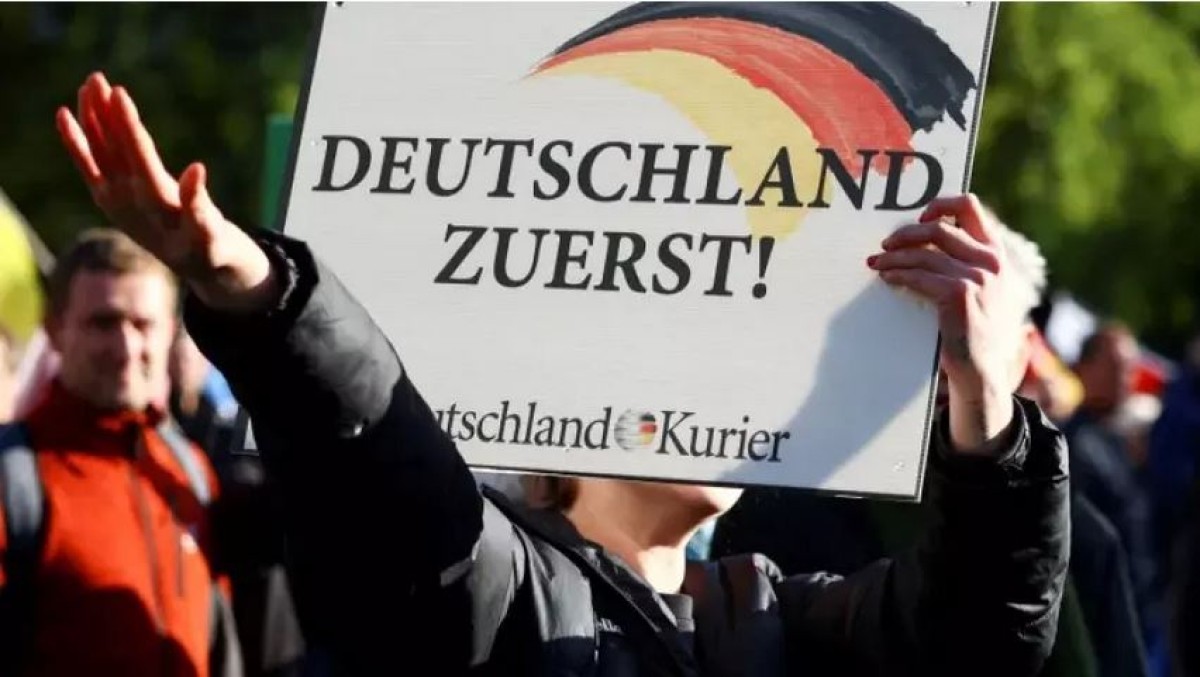 133
133
From Migration to Polarization: The Far-Right Movement's Impact on Germany's Political Landscape
From Migration to Polarization: The Far-Right Movement's Impact on Germany's Political Landscape
Over the past decade, Germany has experienced a significant surge in far-right political influence, primarily driven by the migration waves that began in 2014. The arrival of refugees and migrants, predominantly from Syria, Afghanistan, and Iraq, has dramatically reshaped Germany's social and cultural landscape
Pazooki
Over the past decade, Germany has experienced a significant surge in far-right political influence, primarily driven by the migration waves that began in 2014. The arrival of refugees and migrants, predominantly from Syria, Afghanistan, and Iraq, has dramatically reshaped Germany's social and cultural landscape. This demographic shift has fueled the growth of far-right parties and movements across the nation. In 2015, Germany became the epicenter of a migration crisis, receiving approximately 890,000 asylum applications, a substantial portion of the 1.3 million refugees who entered the European Union that year. By 2020, Germany had accepted over 1.7 million refugees and migrants, positioning itself as the EU nation with the highest number of asylum seekers.
The European Union's policies and geographical position also played crucial roles in this migration wave. The Schengen Agreement, which allows passport-free travel across many European countries, facilitated the movement of refugees and migrants once they reached European soil. Germany's geographical location and its reputation as a prosperous and welcoming country made it a prime destination for asylum seekers. Under Chancellor Angela Merkel, Germany adopted an open-door policy, famously encapsulated in the phrase "Wir schaffen das" ("We can do this"), reflecting the country's commitment to human rights and international asylum laws. This stance contrasted sharply with the more restrictive approaches of other EU countries and was rooted in Germany's post-World War II identity as a nation valuing humanitarian principles. Additionally, Germany's aging population and shrinking workforce created an economic incentive to accept more migrants, seeing the influx as a potential solution to demographic decline and labor shortages. However, this economic consideration was secondary to the immediate humanitarian need, further emphasizing Germany's leadership in advocating for a collective European response to the crisis.
Far-Right Political Ascendancy
The AfD's success has been particularly pronounced in former East German states, where economic stagnation and higher unemployment rates have contributed to social discontent. The party's strongholds, such as Saxony and Thuringia, have seen a notable shift towards nationalist and anti-immigrant sentiment. Polling data from 2023 indicates that nearly 30% of voters in these regions support the AfD, compared to a national average of about 15%. This regional disparity underscores the deepening political and social divide within the country.
The rise of the AfD has coincided with an increase in reported hate crimes and xenophobic incidents. According to the Federal Criminal Police Office (BKA), hate crimes rose by 20% from 2014 to 2020, with over 8,000 incidents reported in 2020 alone. Anti-immigrant rhetoric has also led to increased polarization and tension within communities. In response, various counter-movements have emerged, advocating for tolerance and integration. Organizations such as "Wir sind mehr" (We Are More) and "Aufstehen gegen Rassismus" (Stand Up Against Racism) have mobilized tens of thousands of citizens in rallies and demonstrations against far-right extremism.
Government Response and Policy Shifts
The German government has undertaken multiple initiatives to address the rise of far-right extremism and its underlying causes. These measures include increased funding for integration programs, enhanced support for refugee communities, and stricter enforcement of laws against hate speech and extremist activities. By bolstering these areas, the government aims to create a more inclusive society and curb the influence of extremist ideologies that threaten the country's democratic values. Since 2018, Germany has also grappled with a surge in political violence, reflecting deepening fractures within its social and political fabric. This disturbing trend, fueled by far-right extremism, has led to a significant increase in hate crimes, xenophobic attacks, and targeted violence against marginalized communities. The peak of 8,075 right-wing motivated hate crimes in 2019 highlights the urgent need for robust measures to tackle extremism and intolerance.
Additionally, the polarization of political discourse has exacerbated tensions between opposing ideological factions, resulting in frequent confrontations and violent clashes during protests and demonstrations. Reports indicate a notable uptick in such incidents, with hundreds of violent confrontations between right-wing and left-wing groups posing a direct threat to public safety and undermining democratic principles. Efforts to mitigate these conflicts have met with limited success, as entrenched divisions continue to fuel a cycle of violence and ideological confrontation. In response, German authorities have intensified efforts to combat extremism and safeguard public security, including bolstering legal frameworks targeting hate speech, extremist propaganda, and terrorist activities. Furthermore, proactive measures promoting social cohesion, intercultural dialogue, and community engagement aim to address underlying grievances and prevent radicalization. Despite these efforts, the persistence of political violence underscores the ongoing challenges in fostering a more inclusive and tolerant society, necessitating sustained commitment and collaboration across all sectors of society.
Future Outlook
The future trajectory of far-right politics in Germany remains uncertain. As the country prepares for the next federal election in 2025, it faces a critical juncture. If the far-right continues to gain influence, Germany risks deepening social divides and fostering an environment of intolerance and xenophobia. Such a trajectory could undermine the nation's democratic values, erode social cohesion, and isolate Germany on the international stage. Conversely, a concerted effort to address the root causes of far-right support—economic insecurity, cultural anxieties, and political disillusionment—could help steer the country towards greater inclusivity and unity.
The far-right's continued rise would likely lead to a Germany that is more insular, polarized, and divided. The nation's commitment to democratic principles and human rights could be weakened, leading to increased social tensions and a diminished role on the global stage. The challenge for Germany is to find a path that addresses the legitimate concerns of its citizens while upholding its values of tolerance, inclusivity, and democracy.
 133
133
Comment
Post a comment for this article